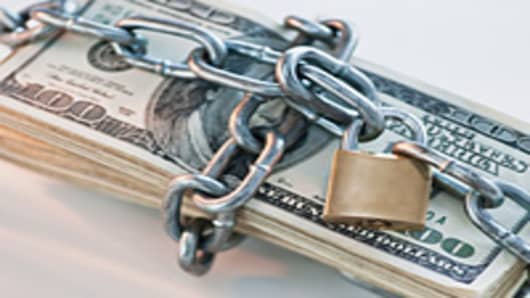Should companies be so afraid of deploying cash by hiring and investing in their own businesses, it could scare off investors and block a critically needed recovery in the jobs market.
“The persistent accumulation of cash, as opposed to investment in new equipment and technologies, is not conducive to long-term growth,” Neal Soss, chief economist at Credit Suisse, wrote in a research note for clients. “And if businesses aren’t growing, they certainly will not be expanding their payrolls fast enough to drive down the country’s worrisome unemployment rate.”
So if companies are so flush with cash, why won’t they spend?
Soss speculates that the primary driver behind corporate frugality is more the aftershocks of the financial crisis than inherent stinginess.
“[I]t is difficult to be persuaded by accusations of generalized corporate greed,” he wrote. “Rather, we attribute the hesistancy of American firms to spend larger percentages of their cash flow mainly on an extremely rare and powerful money demand shock that encompassed the nation during the Great Recession.”
What the high level of cash actually represents is a debate within itself.
Some studies suggest that the bulk of that aggregate figure is concentrated within a few big companies—Apple , Cisco , Microsoft and a band of other big tech firms. Moreover, a good hunk of the cash is offset by even larger debt loads, though that is most true for the large financial firms whereas the figure Soss sites is for nonfinancials.
“Corporations are putting cash to work. They are not just letting it build on balance sheets,” said Gary Flam, portfolio manager at Bel Air Investment Advisors in Los Angeles. “Those metrics get skewed by companies that are top-heavy and with cash trapped offshore.”
But data suggest that the capital is being used only in fits and starts.
A surge in merger and acquisition activity earlier this year has tapered off, and even in that area companies have used a comparatively modest $24.9 billion toward cash acquisitions, according to TrimTabs.
Stock buybacks have swelled to a three-year high of $139.1 billion, but insiders have been selling even faster than companies have been buying.
And most notably, companies are still not hiring. The 201,000 new hires expected from March will barely offset the number of new entrants to the labor force, and the unemployment rate is expected to hold at 8.9 percent when the government releases its monthly jobs number on Friday.
In other words, CEOs remain mindful of their obligations to investors over improving the broader economy. Yet they could find themselves in no-win situation if they don’t act prudently with all that cash.
“If I look at it as an investor I’d rather have that money come back to me as dividends,” said Quincy Krosby, market strategist at Prudential Financial in Newark, N.J. “I don’t think you’ve seen any company awarded for hiring.”
Investors also like mergers, but Krosby warns that some firms might start “deploying cash for deals that don’t make sense.”
And if they do start making more deals, that puts pressure on jobs.
“Theoretically, if you’re at a 45-year high (in cash levels), that should be a bullish sign for employment. That means these guys are going to start spending,” said Uri Landesman, head of Platinum Partners in New York. “If what happens is a lot of M&A, that could be job destructive as opposed to job constructive. It will be very interesting to see how that plays out.”
If companies continue to sit on cash, that will send the message to investors that they’re not interested in growth.
“[C]ompanies themselves understand they eventually face risks if they allow too much cash to build up on their balance sheets,” Soss wrote. “Stockholders, for example, may lose patience with what appear to be underperforming assets…But the challenge remains to induce businesses to risk even more of their precautionary holdings on new or expanded ventures that an ultimately shift the US job machine into higher gear.”
__________________________________________
Questions? Comments? Email us at NetNet@cnbc.com
Follow Jeff @ twitter.com/JeffCoxCNBCcom
Follow NetNet on Twitter @ twitter.com/CNBCnetnet
Facebook us @ www.facebook.com/NetNetCNBC



